Feeding Disorder: A History with Shannon Goldwater of Feeding Matters: Part 2
In this episode we're talking about:
- How Shannon's personal family struggle with feeding her triplets who were born 4 months premature set the foundation for a larger conversation about feeding challenges
- Why achieving universal recognition and a diagnosis code for pediatric feeding disorder was such an important accomplishment for families and healthcare professionals
- The services, education and advocacy that Feeding Matters provide to highlight PFD which is a symptom of over 300 other conditions, such as autism, cerebral palsy, and cystic fibrosis
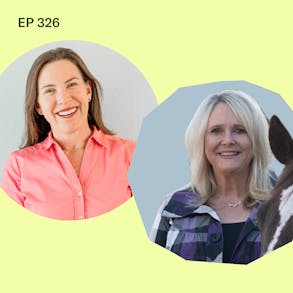
LISTEN TO THIS EPISODE
Links from Episode
- Baby-Led Weaning with Katie Ferraro program with the 100 First Foods™ Daily Meal Plan, join here: https://babyledweaning.co/program
- Baby-Led Weaning for Beginners free online workshop with 100 First Foods™ list to all attendees, register here: https://babyledweaning.co/baby-led-weaning-for-beginners

Latest Episodes

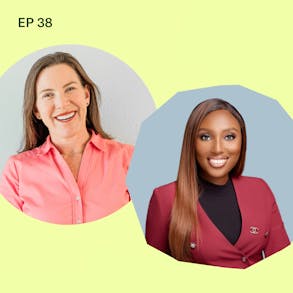

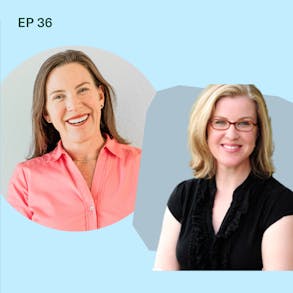
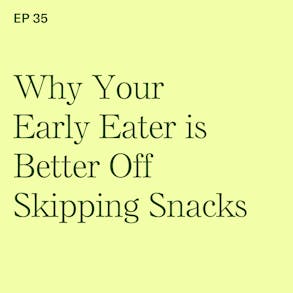
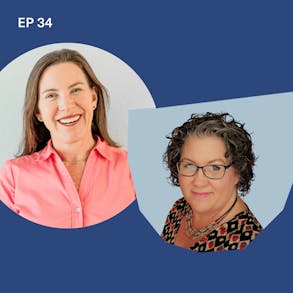
Katie Ferarro (1s):
How are you feeling about your baby's transition to solid foods? I was just talking to a mom of nine month old twins and she said she's terrified to let them eat anything except purees. And I know how frustrating it can feel when your baby is ready, but you're not. And if this is you, I wanna invite you to my one hour online video workshop training called Baby Led Weaning for Beginners. I think this training is gonna ease a lot of anxiety for you about starting solid foods safely and I just redid this training. It's packed with videos and visuals on how to prep foods for your baby, what the food should look like, and what's happening for the first few days, how to reduce choking risk, and then everybody on this free training gets a copy of my 100 First Foods list, so you'll never run out of ideas of foods your baby can eat next.
Katie Ferarro (45s):
You can get signed up for this week's video workshop times at https://babyledweaning.co. If you've got an hour to dedicate to learning about starting solid foods, come take this free online training. Grab your copy of the 100 First Foods list while you're there. Sign up at https://babyledweaning.co.
Shannon Goldwater (1m 2s):
Whatever's being suggested to families has to be carried out every day, multiple times a day. There's no break from eating or feeding your child the way. If you go on vacation or someone's sick, you can cancel a physical therapy appointment. You cannot cancel feeding and nourishing your child. So we at Feeding Matters and the people that are on board with us, which are many, we're so grateful, understand that parents, their voice matters and they have to be included.
Katie Ferarro (1m 33s):
Hey there, I'm Katie Ferraro, Registered Dietitian, college nutrition professor, and mom of seven specializing in baby-led weening. Here on the Baby-led Weaning Made Easy podcast. I help you strip out all of the noise and nonsense about feeding, leaving you with the confidence and knowledge you need to give your baby a safe start to solid foods using baby-led weaning. Welcome back to part two of my interview with Shannon Goldwater, founder of Feeding Matters, the first organization in the world dedicated to uniting families and healthcare providers to raise awareness about pediatric feeding challenges.
Katie Ferarro (2m 13s):
Which, now thanks to Shannon's work and the work of Feeding Matters, pediatric feeding challenges are universally recognized as a symptom of over 300 different conditions like autism and cerebral palsy and cystic fibrosis. If you're just jumping into the podcast here at this episode, I really recommend going back and listening to Episode 324, which is part one of this two part interview, where Shannon shares her personal story about the trauma that she experienced when trying to feed her triplet babies who were born for months premature. That personal journey led her to found what is now the organization Feeding Matters. And in this part of the interview, she's gonna explain the long and arduous path that her advocacy group has been through to get pediatric feeding disorder universally recognized as a diagnosis for which families can now now seek more streamlined medical help and assistance for.
Katie Ferarro (3m 4s):
So Shannon is gonna be talking about the four domains that are associated with pediatric feeding disorder, that's the underlying medical problem or condition, the child's skill and ability, the role of nutrition. And we're gonna talk about where dietitians fall here and then the all important psychosocial piece of helping families who are struggling with pediatric feeding challenges. So here is Shannon Goldwater, founder of Feeding Matters, talking a little more about the history of pediatric feeding disorder and Feeding Matters. So Shannon, thank you so much for coming back to tell us about how your personal life story then led to what is today Feeding Matters.
Katie Ferarro (3m 44s):
I have so many questions after learning more about your backstory, but I can't imagine that like you had put this in your five year plan when you give birth to triplets is like, I'm gonna be dragging them around the country to inpatient feeding. Things are still gonna be on tubes at their 10 year old birthday when your daughter gets her tube out and you're still struggling with this, you had already started Feeding Matters. So can you take us back to the point, like, I think you were talking about a group in your living room that became the first support group. When did you first make that transition from being, like, a mom who was dealing in the thick of it with her own personal situation to like, whoa, what I'm going through is something that other people need to know about and probably are experiencing. We're gonna make this movement and this organization, when did that shift happen?
Katie Ferarro (4m 26s):
How old were the triplets?
Shannon Goldwater (4m 28s):
So, it was during that shift of my personal story when I was in Virginia when they were three and a half years old and I really thought, "I'm not gonna survive this." And so during the time I was at this feeding program, I was actually being contacted by a couple of other local moms who had been referred to me by a shared feeding therapist. And so I invited those mothers over to my home when I got home and I told them that, you know, we shared stories and there's immediate connection, right? And I told them that I wanted to take some money instead of saving for my kids college to invest it into an organization that could improve the lives of children like mine.
Shannon Goldwater (5m 10s):
And I would love their help in doing this. And I didn't know what that was gonna look like or where it was going to lead, but I knew kids like mine deserve better and all kids deserve better. I really thought about the families that didn't have a loving marriage or the financial ability to go or the insurance coverage to get the care that they need or the formula they need or had full-time jobs, didn't have family, right? So for me that was the real driving force behind my mission to make it better, but we didn't really know what that was gonna look like. And so we called ourselves the Founding Mothers and we started by offering parent support, trying to gather other families who were struggling with this because we didn't know that we were using the same therapists, right?
Shannon Goldwater (5m 58s):
That we thought we were alone. You're not taking these children out into public, you know, that are choking and gagging and vomiting everywhere. And people think that if this is so horrible, why have I never heard of it? You know? So it's very difficult...
Katie Ferarro (6m 13s):
And this is like doing the math on it, this is like at the very beginning of Facebook. So like it's not even, like, you could connect in large Facebook groups with all the parents that have this stuff. Like how did you even find these other parents? And you're just around the Facebook era I guess, like pre that, how did you know these people?
Shannon Goldwater (6m 29s):
Right? No, I mean websites were just kind of coming about, you know, I mean even, I mean this is 2005, 2006, so it was you know, a very long time ago. And so it was through the therapist that we originally met and then we started networking with other organizations that provided feeding services and letting them know that we wanted to offer parent support to families they might be treating. And then we decided, okay, we need a comprehensive interdisciplinary team here in Arizona. How can we be, I think we were the fifth or sixth largest city in the United States at that time and we're being referred out of state and we do not have doctors and therapists working together or a comprehensive evaluation, right?
Shannon Goldwater (7m 14s):
So we did a business plan and that's when we realized that boy, some of these services belong in healthcare providers, not necessarily hospitals, but where they have access to other subspecialists and that our efforts could be better served as an advocacy organization. And so what we did initially, and this is really interesting, is we brought together quite frankly, all the different people from all the different programs that I've been to in the past, you know, four years of their life. And when I called these people, I'm here to tell you, they said, well I don't believe what so-and-so does over at organization X and I don't believe what so-and-so does.
Shannon Goldwater (7m 57s):
And so I said, "Please just come, just come and let's get together around the table." And then they introduced us to some other professionals in the field that had not treated my children. And so came to be this first meeting in Phoenix, Arizona sponsored you know, by the seed money that my husband and I donated.
Katie Ferarro (8m 18s):
What, like the triplets college fund is funding this? Like do you have other donors at this point? I mean you guys are paying for this all yourself?
Shannon Goldwater (8m 25s):
Yes. And but but then we, we were so lucky. You know, when something is so pure, when you are doing it for all the right reasons, when you are not trying to duplicate efforts. When you are networking with yourself, with people who understand that nobody has all the right answers, they opened doors for you and our community was amazing to us and believed in us when they didn't have to, right? We could have just gone away. I mean for goodness sake, people never even heard of this. What do you mean your child doesn't eat? Are they missing their esophagus? I mean it was just such a foreign concept back then.
Katie Ferarro (9m 3s):
And what year did Feeding Matters get established as a formal entity? And I assume it was in Arizona nonprofit.
Shannon Goldwater (9m 12s):
Yes. Yes it was in December of 2006. Essentially we bring these people together, right? And we decided immediately let's focus on what we all agree on. We know there's a lot to disagree on. What do we all agree on? You know what came out of it? We don't get referred these children soon enough.
Katie Ferarro (9m 29s):
You're so smart because feeding therapists love to talk about how much they hate the other feeding therapists. All they do is talk smack about each other and they're different approaches. And you said, what's the one thing that we agree on? And everyone can agree, we're not getting the money right? You're not getting the money reimbursement for your services, at which point you can't stay in business. I mean that's major, but what a smart approach to make everyone kind of come together realize what the real problem is!
Shannon Goldwater (9m 52s):
Well, and that the children weren't being referred to them until they've fallen off the growth chart. They're not meeting developmental milestones. Parents have gone to extraordinary measures and there are real damages done in the relationship between parents and, and their children. And so they wanted to be identifying these children sooner and then being seen. So that became the birth of what today is known as a published screening tool called The Infant and Child Pediatric Feeding. So our very first meeting was the birth of what is today called the Feeding Matters Infant and Child Feeding Questionnaire.
Shannon Goldwater (10m 35s):
And it is based on, you know, traditional developmental milestones that helps you identify red flags associated with feeding, to foster a better conversation with your primary caregiver so that hopefully it doesn't take my child is now not growing and now not meeting developmental milestones before we pay attention.
Katie Ferarro (12m 6s):
So you get the organization off the ground in 2006. And then what year did you guys get the diagnosis code for pediatric feeding disorder?
Shannon Goldwater (12m 14s):
2015? So, or 20, sorry.
Katie Ferarro (12m 15s):
I'm not saying like, but what are you doing the whole time? But what happened in like it, did it take 14 years or did it take a while to say, listen, the mission that we need is that we need to have a universally recognized diagnosis code for pediatric feeding disorder so that we can get reimbursed for our services when people are referring to pediatric feeding experts, is that...?
Shannon Goldwater (12m 40s):
Right. So what what happened is we were actually really trying to find our way. And so what, what our medical professional counsel said to us, please, please know that the problems you're having in Phoenix, Arizona, they're having in Washington DC and they're actually having in Sydney, Australia, and please think about applying your work at a global level. And so we had to find our footing that way. And so we started with conferences and putting together education and resources for families. But again, I was being kept up at night with the idea that it was exhausting to try and explain to people what I meant when I said my children couldn't eat or they had difficulty eating.
Shannon Goldwater (13m 26s):
And so it wasn't until 2015 when literally I was awake at night feeling like we've been in operation for 10 years, we're not moving fast enough. Right? The Infant and Child Feeding Questionnaire research took forever. You know, you have to raise a lot of funding for that. So anyway, I just had an epiphany and I said, I know why, because this is not a condition, this is a symptom.
Katie Ferarro (13m 49s):
So you guys are meeting, you bring all the professionals back, you're like, the big problem is that we don't have not just a diagnosis code, we don't even know what to call this thing. We need to kind of wrap it all up. This is your idea in front of all of these professionals. And then where do you guys go next?
Shannon Goldwater (14m 6s):
Yeah, so that was in 2015 and and the council said, you know, you're absolutely right and what we need to do is create a definition and an identity for the condition. And so that was the birth of what became a consensus paper. So in March of the following year, 2016 in Arizona, we gathered over 17 experts from around the world to determine a name, definition, and diagnostic criteria for pediatric feeding disorder. That pivotal meeting led to two years of collaborative work to write and publish the paper titled Pediatric Feeding Disorder Consensus Definition and Conceptual Framework in the January 2019 Journal of Pediatric Gastroenterology and Nutrition.
Katie Ferarro (14m 57s):
So you get your operations running for 10 years, we're not moving fast enough. Then you decide, okay, we're gonna kind of narrow down, we bring everyone together, you get the consensus paper published, but you still don't have a diagnosis code. So how many years did it take from the time basically the world heard the term pediatric feeding disorder until it became a diagnosis code?
Shannon Goldwater (15m 20s):
Well the total was five years. So the idea was presented in 2015. We started in 2016, it was published in 2019, then COVID hit and in October of 2021, the ICD code was approved and was to be included in the United States ICD10 in October of 2021. So it was five years. It's really quite remarkable. The authors of this paper are truly extraordinary and the parent voice was part of the entire process. And that is what is so special I think about Feeding Matters, is that we truly are the only organization of our kind, you know, working to bring together medical professionals and families, right?
Shannon Goldwater (16m 18s):
Because families have such an important voice in how we treat children with pediatric feeding disorder. Because unlike other conditions, right, there's not a place to go and get a surgery and get fixed or go and get the medicine for chemotherapy. Whatever's being suggested to families has to be carried out every, every day multiple times a day. There's no break from eating or feeding your child the way if you go on vacation or someone's sick, you can cancel a physical therapy appointment. You cannot cancel feeding and nourishing your child. So we at Feeding Matters and the people that are on board with us, which are many, we're so grateful, understand that parents, their voice matters and they have to be included.
Katie Ferarro (17m 4s):
Could you share a little bit for us about what sort of services Feeding Matters provides today?
Shannon Goldwater (17m 9s):
Sure. And I, I just wanna back up and say in case we can use it, but you know, Feeding Matters is the first organization in the world uniting families, healthcare professionals, and the broader community to improve the system of care for children with PFD. And we do this through advocacy, education, support, and research. And so we are really, what we deem ourselves is the umbrella, right? For so many conditions that a pediatric feeding disorder may be resulting from. So in my kid's case, right, it's from extreme prematurity. For another family, it might be autism. For another family, it might be a heart condition, right?
Shannon Goldwater (17m 52s):
But when you have a a feeding condition, it takes a group of specialists working together and parents' voices and medical professionals working together. So today, Feeding Matters offers so much education and advocacy not only for professionals through workshops and and webinars. And actually our conference is about about to happen in just a few short weeks. But we also provide these things to families in need through programs like our Power of Two Program, which is the mentoring program where we connect parents with other parents who are further along in the process.
Shannon Goldwater (18m 34s):
Our research is, you know, has a big focus on including families in the work of the research to break down the barriers in the field because it's often very one-sided and not representative of the community. So our research efforts, it's very important that we, we not only include parents, but we also look into how education happens or doesn't for the various disciplines and the domains, particularly in the feeding skill domain. But really it then all goes back to family support, right? Resources, information, The Power of Two Program, our financial assistance program.
Shannon Goldwater (19m 18s):
We've also been able to develop May as Pediatric Feeding Disorder Awareness Month. So there are so many resources that we offer not only to families but also to the medical professionals who are treating and servicing them.
Katie Ferarro (20m 41s):
And Shannon, how have things changed both for families and for practitioners since Pediatric Feeding Disorder became a diagnosis code?
Shannon Goldwater (20m 47s):
Well, I'll tell you the greatest change has been the recognition of it being its own condition. We have countless stories of families, you know, actually sharing about the impact that it's had on their life for them personally and being able to describe it as a condition to those people that don't know that love and support them. It's also meant greater access to care at various institutions. It's also led to new research. And I have to tell you, I spoke with a parent a few years ago and I reconnected with her just a year ago. And during COVID, her child had aged out of the early intervention service and she said, and I'm so thankful because now that COVID's over, we were able to go back and be reevaluated and my child was diagnosed with PFD and now I'm getting service again that was denied to me because there was no diagnosis.
Shannon Goldwater (21m 45s):
So even though we don't have all the answers right, and we need more best practices and more research, at least we can start to identify the prevalence of the problem, and work for reimbursement and packages for care so that the practitioners that are working are able, as you said, to be paid for their services. And so that more people are interested in entering the field, right? Learning about this new emerging field because the reality is kids are living longer than they did before. And some of those consequences of incredible medical advances may include things like severe disruptions to feeding, which lead to pediatric feeding disorder.
Shannon Goldwater (22m 32s):
So it's important that we really pay attention. Some of our early research numbers indicate that 1 in 37 children under the age of five annually, and 1 in 23 for those with public insurance, and 1 in 5 for children with chronic conditions have pediatric feeding disorder. It's actually more prevalent than autism and cerebral palsy, but the code didn't exist. So we really think that these numbers are conservative. Having a code will allow us to bring more definitive numbers to the actual number of cases.
Katie Ferarro (23m 10s):
I know that you describe yourself as the founder and you are an Emeritus board member. You're clearly very, very, very involved with Feeding Matters, but there's a new group of professionals who are taking your mission and have run with it. I know of so many people familiar with your organization who would've never been familiar with the term pediatric feeding disorder. If it weren't familiar, it wouldn't even be around if it weren't for Feeding Matters, obviously. Who's at the helm today and what would you like to see Feeding Matters accomplish in the next 20 years?
Shannon Goldwater (23m 41s):
Yes. Well we are so lucky. First of all, we have a PFD alliance, we call it, which is allows medical professionals to join us, us from all over the world to learn and access our resources, be part of our town halls. We have an amazing CEO Jacqueline Goriss who not only is a mother herself, but just so driven and passionate about this issue and an exceptional leader that I think the biggest thing that we want to see has always been the ultimate mission, which is that here's what needs to happen. This is the dream that a parent goes to their primary care provider or whomever that may be.
Shannon Goldwater (24m 28s):
And if they say, I have concerns about feeding, a few things happen. One, that provider has access to the resources they need to determine is this just a phase or is this something we need to be paying closer attention to? So that's key number one, right? We need that early identification screening tool. Then they need to have access to qualified trained medical professionals representing all four domains associated with pediatric feeding disorder, which for your audience is, you know, the medical component. Is everything working right? It's the skill and ability component, right?
Shannon Goldwater (25m 8s):
Can they chew and swallow? It's the registered dietitian for the quality of the nutrition that these children are taking in. And then it's the whole psychosocial piece. What's happening to the dynamic of the family or the parent-child relationship as a result of these challenges so we need professionals that work together in all of these domains to evaluate and treat these children. So that's going to take a lot of work. But ideally a pediatrician would have a resource, right? Wherever they live in the world to send families to for a comprehensive evaluation.
Shannon Goldwater (25m 48s):
The days of passing children from provider to provider who don't speak to each other, it does not work for these families, it does not work for the healthcare system. And people are, enough children are unnecessarily suffering.
Katie Ferarro (27m 17s):
We have families who are listening both from the healthcare provider standpoint and from the affected family standpoint. And one thing that I think is so unique about Feeding Matters, and you've said it over and over in these two interviews, is that you incorporate both the provider side and the families. And guess what guys? You need to talk to each other. And you guys are doing such a great job with that. I know I'm part of your Southern California Professional Alliance, I'm gonna get to meet Jacqueline in person this summer, which I'm really excited about. And so I think you do a great job networking with the professionals and then also looping in the parent stories. And you guys have moved so incredibly lightning fast compared to what most other groups are able to accomplish. Where can our audience go to learn more if they are either on the provider side or on the parent side?
Katie Ferarro (27m 59s):
Meaning that they're dealing with a child that they think might have pediatric feeding disorder?
Shannon Goldwater (28m 9s):
Yes, you can learn more at https://www.feedingmatters.org/. It's a very comprehensive website that really provides a platform for all of the people that need to be at the table working to find solutions for pediatric feeding disorder. All are welcome and encouraged to be part of our alliance, our programs, our research, our conferences. I mean the list goes on and on. The idea being there are many stakeholders, it takes a village and feeding is so complicated.
Katie Ferarro (28m 42s):
And Shannon, I wanna say a professional thank you. As a registered dietitian for too long, registered dietitians have not been part of the feeding therapy conversation. A registered dietitian nutritionist in the United States cannot train to become a feeding therapist yet in your four domains associated with pediatric feeding disorder, you acknowledge the importance of the role of the registered dietitian, whereas that has always been the problem in so many of these other attempts. A addressing child feeding issues is that it's just the SLPs and the OTs working by themselves in the home and not acknowledging the role of the dietitian and not that one specialty can do it all.
Katie Ferarro (29m 22s):
We've learned that through the mistakes over the decades that we need to be working together. And so thank you for including registered dietitians and giving them a place at the table and for inspiring a whole new generation of dietitians who now have a place where they can work in the realm of pediatrics besides just helping children in an inpatient setting or if they're in the NICU, we can actually help these children from the outpatient standpoint so they can live in their homes and enjoy meals with their families, whatever that may look like,
Shannon Goldwater (29m 54s):
Right? And that transition should be fostering at always a positive parent-child relationship. And so I, I just thank you so much for being part of this movement. I call it a movement now because it's amazing. It's a launching pad for so many great things to come. We do need best practices, we do need certifications, we do need all of the stakeholders at the table. And you're absolutely right, case after case of children and families being denied registered dietitians to look at their diet, to get formulas. I mean it's quite frankly unbelievable.
Katie Ferarro (30m 29s):
And this is a discussion for another time and place, but dietitians went through the same thing. I remember when I started out in private practice, we had just gotten with two diagnosis nutrition codes, we had codes to reimburse. Basically there are already diagnosis codes, but dieticians didn't get reimbursed for their services. And it is about the money and a hospital system or an outpatient, they can't afford to pay you if they're not getting reimbursed for your services. And I remember what a big deal it was when dieticians could start billing just Medicare for two different diagnosis code, think of all the things related to nutrition, and yet it's only diabetes and heart disease or non-dialysis kidney disease that dietitians could be involved in. And it takes so much work and so much advocacy and you don't see the behind the scenes stuff.
Katie Ferarro (31m 10s):
So I appreciate you sharing the behind scenes. It might be boring to people to listen to, but if you're a medical biller and you know how important the codes are, cuz otherwise you're not gonna get paid. And if you don't get paid, then the only people who can get treated are those that have the disposable income and that's not who it should be. And that's not how it should be.
Shannon Goldwater (31m 25s):
Yeah, I, I just wanna end with the fact that I think the message has to be to remind people of the importance of feeding as it relates to a child's overall wellbeing in all realms, social, emotional, cognitive, how important that is when it's going right. So when it's not going right, all the more reason we need to be paying attention and we need to be offering the support and the resources that these families and children need and deserve.
Katie Ferarro (31m 58s):
Well, thank you for the work you do and thank you again for sharing both your personal story as well as your professional journey with your work with Feeding Matters. We so appreciate it.
Shannon Goldwater (32m 7s):
Yeah, thank you for having me and I really hope I will meet you in person and Jacqueline told me that she was talking with, with you and you are just gonna see what a dynamite she is. I mean, I am her biggest champion. I mean, they have big plans and I just wanna be part of all the good that they're doing and to see my dreams be a launching pad, I just can't tell you how rewarding that is for me to see people like yourself coming to the table, making this a priority in your spheres of influence is so important and understanding right? All, all the parts to it.
Shannon Goldwater (32m 48s):
Like you said, you can't provide care if you can't get paid and we recognize that too, but it's, it's gonna take an army and so we certainly appreciate you and your dedication to this issue. And like I said, I, I was blown away today by my girlfriend whose grandkids, their mother, is listening and just is a big admirer of yours.
Katie Ferarro (33m 13s):
Well, I hope you guys enjoyed learning more from Shannon Goldwater about the history of pediatric feeding disorder. The work that Feeding Matters does. And I'm going to link all of the resources that she mentioned, especially if you are a healthcare provider or a family struggling with pediatric feeding challenges. Those links will all be on the show notes page for this episode, which you can find at https://blwpodcast.com/326. So we'll have a link there to the Infant and Child Feeding Questionnaire. The screening tool will also have the entire pediatric feeding disorder, the consensus definition, and conceptual framework paper. That's the published paper that they had, the kind of predated the diagnosis code, as well as a lot of other resources associated with Feeding Matters.
Katie Ferarro (33m 57s):
Again, that's at https://blwpodcast.com/326. Thank you to our partners at AirWave Media. If you guys like podcast that feature food and science and using your brain, check out some of the podcasts from AirWave Media or online at https://blwpodcast.com. Thank you so much for listening and I'll see you next time.

The Program Baby-Led Weaning with Katie Ferraro
A step-by-step digital program for starting solid foods safely and navigating the original 100 FIRST FOODS™ meal plan with baby-led weaning.
 EXPERT-LED, PROVEN APPROACH TO EATING REAL FOOD
EXPERT-LED, PROVEN APPROACH TO EATING REAL FOOD CONCISE VIDEO TRAININGS TO MASTER BABY-LED WEANING
CONCISE VIDEO TRAININGS TO MASTER BABY-LED WEANING 100 FIRST FOODS DAILY MEAL PLAN WITH FOOD PREP VIDEOS
100 FIRST FOODS DAILY MEAL PLAN WITH FOOD PREP VIDEOS
Baby-Led Weaning for Beginners Free Workshop
Is your baby ready to start solid foods, but you’re not sure where to start? Get ready to give your baby a solid foundation to a lifetime of loving real food…even if you’re feeling overwhelmed or confused about this next stage of infant feeding.
Get baby-led weaning recipes and tips delivered to your email inbox.

